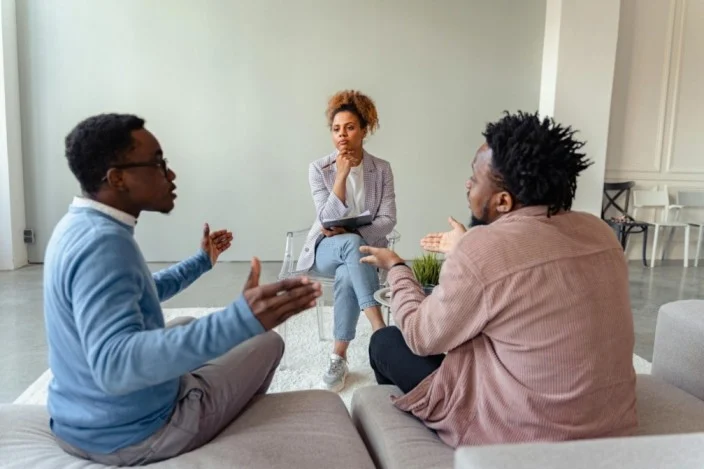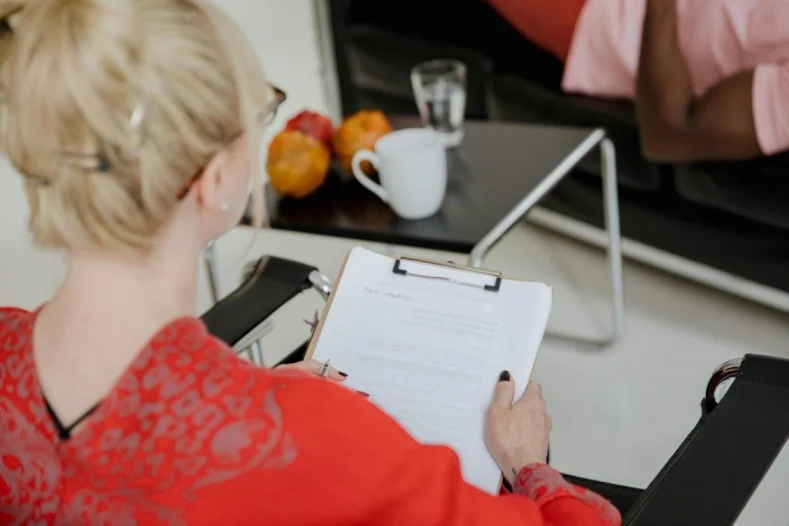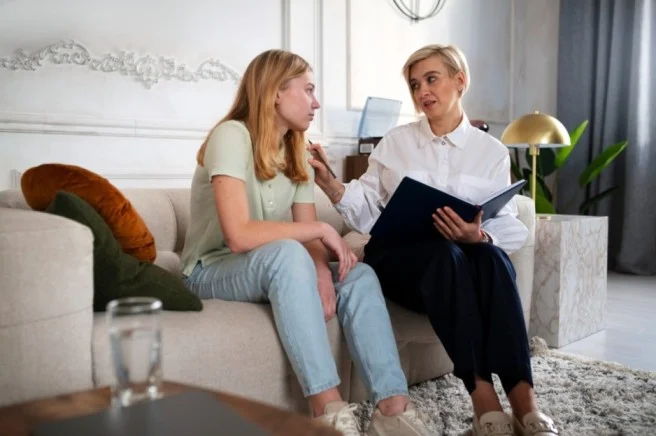What Is the Purpose of Group Therapy In Maryland?
Get group therapy experience in Maryland. Heal, connect, and learn with skilled facilitator sessions on anxiety, depression, and healing from trauma.
Why Group Therapy is Critical to Mental Wellbeing in Maryland
Struggling with mental health challenges is often a solitary, intimidating ordeal. But Maryland group therapy offers a convenient, nurturing, and organized environment where individuals can come together to heal, communicate, and learn from one another. If you’re struggling with anxiety, depression, PTSD, or relationship issues, group therapy provides the space to connect with others who truly get what you’re going through.
In a therapist-led setting, patients can express their emotions, learn valuable coping strategies, and feel accepted. Most participants feel at ease knowing that others experience what they do, having the epiphany that they are not alone in their situation. Group therapy facilitates open communication, encouragement of support, and emotional healing and enables individuals to attain personal development they may not acquire from individual therapy.
Additionally, group therapy helps individuals enhance communication skills, build self-confidence, and develop resilience in a structured yet welcoming atmosphere. With professional guidance and peer support, participants gain insights, emotional validation, and practical techniques to navigate life’s challenges effectively.
If you’re looking for a compassionate and empowering way to improve your mental well-being, consider joining a group therapy session in Maryland and take the first step toward healing today.
What Is Fort Washington, MD Group Therapy?
Group therapy is a directed, therapist-led counseling technique that involves bringing together individuals suffering from similar mental conditions. It is a relaxing, supportive, and non-judgmental setting in which the members can openly share their emotions, share experiences, and learn beneficial coping mechanisms. It consists of 5 to 15 members, making it efficient enough to have meaningful discussions and peer support.
Unlike individual therapy, group therapy helps members realize that they are not alone in having such problems. With the application of guided conversation, members learn new information, emotional support, and constructive criticism, which can help them heal. A trained therapist keeps sessions structured, goal-oriented, and effective, with an environment conducive to growth and friendship.
Types of Group Therapy in Maryland
✔ Support Groups – For those grieving, traumatized, ill chronically, or experiencing major life transitions. These groups help individuals process feelings and gain strength from shared experiences.
✔ Cognitive-Behavioral Therapy (CBT) Groups – Designed to help participants recognize and reframe negative thought patterns. CBT-based groups teach participants healthy coping skills for anxiety, depression, and stress management.
✔ Process-Oriented Groups – Provide an open, flexible forum for discussion in which individuals can find emotions, develop self-awareness, and develop healthier patterns of behavior.
✔ Skill Development Groups – These groups are designed to teach essential skills for life, such as stress management, effective communication, control of emotions, and the improvement of self-esteem.
✔ Trauma Recovery Groups – For those experiencing PTSD, abuse, or prior history of trauma. These groups excel at recovery, empowerment, and increased resilience through a variety of techniques.
✔ Addiction & Recovery Groups – Offer guided support for overcoming drug and alcohol use and addiction. Members acquire skills of relapse prevention, personal responsibility, and coping techniques required to maintain ongoing sobriety.
Regardless of the issues being faced through personal problems, emotional distress, or significant life changes, group therapy in Fort Washington, MD can offer the care and assistance required to mend, feel connected, and gain lasting mental wellness.
The Benefits and Purpose of Group Therapy In MD
✔ Creating a Sense of Community
Mental illness can be lonely. Group therapy offers a chance for participants to meet others who understand what they are going through, creating a sense of community and reducing feelings of loneliness.
✔ Learning from Others
Group members are able to share coping strategies and provide insights. By listening to others, participants are able to gain a new perspective on their own problems.
✔ Development of Communication Skills
Group therapy provides the opportunity to develop social skills, practice good communication, and become more confident in communicating feelings.
✔ Responsibility & Inspiration
Members inspire each other to maintain progress and personal growth, resulting in individual development and final success.
✔ Emotional Support & Stigma Minimization
Working in group therapy with others with the same kind of problems decreases stigma and lets participants feel listened to and less ashamed of mental illness.

Who Can Benefit from Group Therapy in Maryland?
Group therapy is a great and nurturing intervention for individuals coping with many kinds of mental illness. It is a therapeutic, therapist-led environment in which individuals can relate, learn, and gain emotional support from others with similar issues. If you are experiencing stress, trauma, or issues related to personal growth, group therapy is a useful tool for both healing and personal development.
Who Can Benefit?
✔ Anxiety & Stress Management – When you’re perpetually worried, overthinking, or suffering from panic attacks, group therapy instructs on healthy ways to manage stress, calm anxious thoughts, and regain control of feelings.
✔ Depression – Isolation is a trigger for depression, but connecting with others in a nurturing setting offers hope, motivation, and a sense of belonging. Group members help each other learn healthy coping mechanisms and self-care.
✔ PTSD & Trauma Recovery – Individuals who have experienced abuse, violence, or other trauma can process their emotions in a secure environment. Group therapy helps members grasp their trauma, reduce emotional distress, and become resilient.
✔ Relationship & Family Issues – If you’re experiencing conflict with loved ones, communication issues, or trust issues, group therapy offers conflict resolution, boundary establishment, and emotional intelligence coaching.
✔ Recovery from Substance Abuse – Overcoming addiction and dependency requires strong support systems. Group therapy provides accountability, relapse prevention, and means to maintain sobriety.
✔ Low Self-Esteem – Members usually struggle with uncertainty about themselves, negative self-talk, and low self-esteem. Group exchange, affirmations, and peer support can help members build self-worth and self-acceptance.
✔ Life Transitions – Varied transitions such as divorce, career change, relocation, or the loss of a loved one can overwhelm people. Group therapy helps individuals to adjust to change, regulate their emotions, and adopt productive coping skills.
Regardless of whether the challenge is divorce, career change, relocation, or loss of a loved one, group therapy in Maryland forges a synergistic, healing space that supports individuals to overcome adversity, find resources, and emotionally expand.
What to Expect during a Group Therapy Session in Maryland
It’s natural to be nervous or apprehensive before your first group therapy session, but knowing what to expect helps overcome fear and put you at ease for a positive experience. Group therapy is meant to be a safe, structured, and helpful setting in which participants are encouraged to reveal themselves, grow, and become a better version of themselves through the guidance of a trained therapist.
What to Expect in a Session
✔ Introductions & Guidelines – The therapist will establish the goals, rules, and expectations of the group at the beginning of the session to create a safe, confidential, and respectful environment. New members can introduce themselves, but no one is pressured to share until they feel ready.
✔ Sharing & Discussion – Members exchange turns talking about their issues, emotions, and personal experiences when it comes to concerns such as anxiety, trauma, depression, or personal growth. Listening to others’ narratives helps participants realize they are not isolated in facing problems.
✔ Therapist-Led Exercises – Depending on the session theme, therapists can include structured exercises such as role-playing, cognitive behavior techniques, mindfulness meditation, or problem-solving exercises. These exercises help individuals learn coping strategies and become emotionally attuned.
✔ Feedback & Reflection – One of the best things about group therapy is the encouragement, honest feedback, and different perspectives one can get from others. Group members assist each other, helping individuals become conscious of their emotions, behaviors, and thoughts.
✔ Homework & Goal Setting – To assist in consolidating gains, the therapist may provide participants with homework or self-reflection assignments to complete outside of sessions. Such activities may be writing in a journal, mindfulness tasks, or the practicing of new communication skills in daily life.
Group therapy provides a structured yet flexible setting where individuals can heal, connect, and build emotional resilience. Each session is designed to foster self-awareness, emotional growth, and long-term mental wellness. If you’re considering group therapy in Maryland, knowing what to expect can make the experience more approachable and rewarding.

How to Obtain the Most Appropriate Group Therapy in Maryland?
Obtaining a proper group therapy program is essential for a valuable experience. Following are some important tips to consider:
✔ Trained & Licensed Therapists – Allow the group to be led by experienced mental health professionals.
✔ Targeted Groups – Find groups that specifically address your specific issues (e.g., healing from trauma, coping with anxiety, developing self-esteem).
✔ Safety & Comfort – A good therapy group provides a judgment-free, confidential setting in which members feel comfortable.
✔ Convenient Scheduling – Select a program that fits your schedule, in-person or online sessions.
✔ Insurance Coverage – Look for clinics covered by Medicaid, CareFirst, and Cigna for the costs.
The BGH Clinic for Women’s Health offers experienced group therapy in Maryland that supports individuals in recovery and personal growth in a caring and protective environment.
Frequently Asked Questions: Group Therapy in Maryland
1. How often is group therapy attendance?
Most groups meet weekly or every two weeks depending on the needs and schedule of individuals.
2. Is group therapy as effective as individual therapy?
Yes! Group therapy is just as good, with peer support, diverse perspectives, and therapist guidance in a group setting.
3. Will I be asked to disclose personal information?
No. Members are invited to join, but they can share as much or as little as they want and are never forced to speak.
4. Can I attend both individual and group therapy?
Yes! Some find it beneficial to do group therapy and individual therapy simultaneously to reap the most out of their mental health experience.
5. How do I enter a group therapy session?
Call 240-240-3318 or visit thebghclinic.com to make an appointment.
Begin Your Healing Journey Today
If you’re looking for group therapy in Maryland, The BGH Clinic for Women’s Health is here to help. Our compassionate, professionally facilitated sessions provide you with a safe space where you can heal, connect, and grow with others who truly get your experience.
Address: 5620 St. Barnabas Road, Suite 312, Oxon Hill, MD 20745
Phone: 240-240-3318
Schedule an Appointment: The BGH Clinic For Women’s Health
Start your path to emotional well-being—join our group therapy sessions today!




